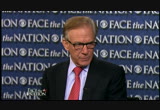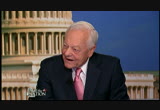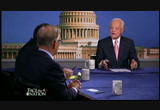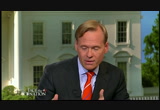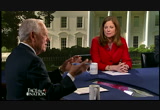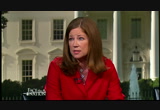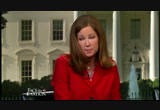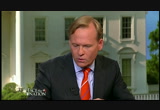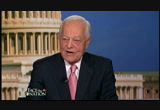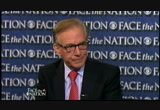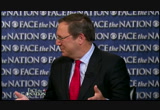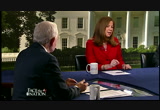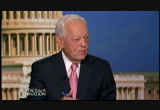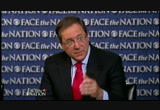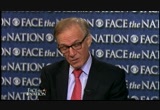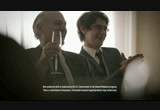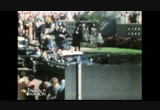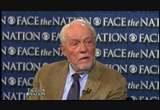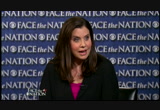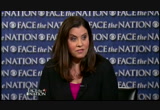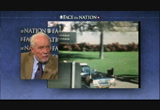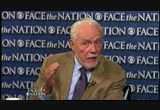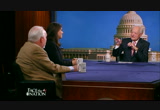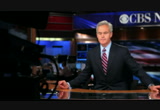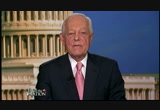tv Face the Nation CBS November 3, 2013 5:00pm-5:31pm PST
5:00 pm
>> schieffer: welcome back to "face the nation." for analysis on this news and there is a lot of news. david ignatious, columnist for the "washington post." david sanger the chief washington correspondent fort the "new york times." our cbs news chief legal correspondent jan crawford our other own john dickerson. i don't know where to start i'm just going to pull something out of the air say we'll start with nsa surveillance. i guess nobody is surprised find out that great powers spy on anyone. is anyone surprised that the president and white house denied that he was aware of this? can that be? >> well, we'll find out. i think there will be careful examination of this. he gets his president's daily briefing every morning they go through precisely the information nsa collects. that's the prize trophy in the briefing every morning. i think it's likely that the president wouldn't drill down on
5:01 pm
the precise individuals except in the cases where involve u.s. war fighters overseas, i'm sure he knows it's karzai saying to chief of staff, whether he knew it was angela merkel talking on her cell phone, i don't know. what we've seen is the nsa is just one of those organizations that if it can do it, it will do it. these are young, techno-phyles they solve these puzzles for the challenge they got out of control. i like to the sorcerers, all the buckets of water. it just got out of control. >> schieffer: what it does kind of make you wonder, doesn't it, david, maybe just because we're reporters, but i'm sitting here reading this or getting this intelligence brief, wouldn't you say, how do you know that? >> in the first year of presidency i could image in a president not knowing it. by year five you have to say, at some point he's likely to of a asked that question. if he didn't, it's almost
5:02 pm
certain that many of his national security aides would have. because while the president gets as david indicated this presidential daily brief, it's an analytical product. what his aides get are the product and the annex beneath it of the raw intelligence. so, that then raises the question of oversight which is, angela merkel was not a high proceed court target, nobody was worried about germany. or nuclear proliferation or so forth. she is part of what david describes, i think quite rightly as system that was mostly on auto pilot. and they have collected this kind of thing from allys back to the days of the cold ward. >> schieffer: isn't this -- i mean the level of hypocrisy here on the part of our allies. i mean i'm just aghast to find this out. everybody has known about this just support of the way it was. those of us in washington know these kinds of things are going on.
5:03 pm
>> mike rogers said it in a humorous way, espionage is a french word. everybody does do this this is just part of conduct of foreign policy since u.s. revolutionary war times, since the beginning of history you have had pies. what is different is technology, the capability to listen in to everything. and i think that that is what the administration is dealing with is technology so different we'll have to think about new rules of the road. >> i was going to say in this question of running amuck being on auto pilot you used that borrowed, that ask what sect of state kerry said. you add this technological capability if it's running on auto pilot and people who are overseeing don't know what it's doing, then it has this control and overseers don't know what it's doing and one of the amazing things what nsa was doing with google and yahoo! scraping all of their data out of the area that ability does make it seem like the nsa has found new mothers for itself
5:04 pm
that the people who were supposed to other sees, supposed to keep this kelp del cat wall between safety and civil liberties they don't know what is going on. >> the mystery here is the between what john said they can do and what they actually are doing. in the case of google and yahoo! even in the case of angela merkel we know that they can get at the cloud, we know that they can get out her cell phone. the mystery that we don't know as a reporting target for us, these days, how much are they pulling down. and on that they have been extremely quiet. let me -- >> schieffer: as i'm listening, i'm thinking, i guess it's a little unforce natural that didn't let the nsa put together the -- for obamacare. because we talk about on this side of the table how wonderful and these great capabilities. i have never seen anything that flopped the way this thing. >> the thing is when you hear all these technological advances that are leading to surveillance people just assume in their
5:05 pm
daily lives. technology at some point is going to work. i think that was going in to the website. something nobody -- americans would not have expected people in the white house that were not testing this getting some clues leading unto the launch. now you have david axelrod saying, this website is a debacle. i think the problem now for the white house is that you can fix a broken website. but this is more than a broken website because for a lot of americans, this isn't just introduction to a website. it's that are introduction to the affordable compare fact. if you go back, gallup did an interesting poll, 71% of uninsured americans didn't know, weren't familiar with the affordable care act. now what are they seeing? broken website. cancellation letters going out to millions of americans saying, they're going to lose their existing coverage. something no one expected because the president repeatedly said if you write your plan you can keep it. notice, is that new premiums
5:06 pm
might be higher in some cases. so all of this kind of goes in to play they can't get on the website to find out more information. it's this perfect storm of a lack of information, information they're getting that they didn't expect a president who made promises that it appeared, at least a lot of people in the white house knew he wouldn't be able to keep. >> schieffer: you base that on what -- there's story this morning in the "washington post" that details before the president made those statements that if you like your health care plan, you can keep it. that they were debating in the white house whether he should say -- >> the journal had a great piece yesterday talking about that as well. the internal debate suggesting this was a little more than the president at the "new york times" put it this morning, misspeaking here. because there was apparently, now being reported this extensive debate whether he should say that. policy advisors knew that wasn't going to happen. that these plans will have to change to meet the new minimum
5:07 pm
requirement of obama care including ones before march of 2010 which is where they're trying to draw this line now. those plans also have to -- bob job, what happens sneer are they going to have to post bone? you have a deadline where people don't get their health insurance by certain time they're going to fined. but of a website that they can't get on to get their health care. >> so the problem is there could have been -- there could be some delays in different ways to delay it but the problem with delay is that while it might help out those people who are desperate to get on to the obamacare program, the insurance companies don't want that because they want mechanism to force people to sign up. because of these risk pools. they need lots ever healthy people getting these risk pools to keep the prices down. you want some things to force people in if you elongate the period that they can come in or take away the fine for not signing it up reduces the appreciate that you are creates a policy problem. what you have now you have some political problems and some bad
5:08 pm
pr problems but this would create potentially a policy problem. problem is that lot of democrats who have defended the affordable kay act those up for reelection in 2014 now see a real problem. more than just a website as jan detailed. it's now a problem both with the overall health care but then it's also a government problem. there's a story in the "washington post" today that is really amazing about a memo that was written by david cutler to the white house, white house health care advisor in 2010 saying you're not ready toe roll this out. then you get in to a very big problem democrats are going to have to defend which is can can a government handle the question like this this and republicans have all along argued, no, it can't. that gets to be a very big problem that can spin out of control. >> schieffer: you know, i think this goes beyond politics and fall out for republicans and democrats. this is about health care and a law has been passed that people are going to have to have it. now it's difficult to figure out how they're going to get it. what happens here, david? >> well, i think the reality is
5:09 pm
that we're going to stumble through a period of trial and error. the only thing i'd say is that there's no technology success streets in the world, he is specially in america that doesn't have a kind of rough break-in period. we have a zero defect culture for washington. anything in washington has to be perfect the first time out because it's so political. but in the real world, companies have beta products that crash all the time. and don't work. when microsoft began everyone of us had error messages that drove us crazy it gets better. that's what will happen here. i think people should just think, more like maybe what they experienced dealing with technology companies than it is like what they get from government which is rulely basically. >> schieffer: it occurs to me as you look -- you step back from this look how other countries are looking at the united states right now. it's just one more case of how we can't seem to get out of our
5:10 pm
own way. i mean, we have the government in constant gridlock, we're not making decisions the way that great powers traditionally do. and now this is just one more thing for people to say, what is going on over there? what are you guys doing to yourselves? >> the government gridlock raises a question of whether or not we can make the policy decisions we need to be a global leader. the health care, computer system issues raise the question of whether we can execute. and execution has been -- one senior member of the obama administration said to me this week, that they were dealing with all of this their real achille's heel throughout. just for exactly the reason that david laid out that we all seen computer systems that roll out badly. always getting microsoft updates to our operating systems and so forth. that would have argued in favor of the obama administration making sure that this system was
5:11 pm
being test run for six months or a year before it came out. which is what most technology companies will tell you in large, complex piece of software requires. instead they gave this weeks. and that is actually i think where the investigative focus should be, why they tried to go do this so fast and so on the fly. >> in some cases they gave days, companies that were going to be working and needing the systems to tap in to, online insurance, private insurance companies they got the information from the white house two days before the site went live they weren't able to get down the testing that they would have required. yes, this website is going to get fixed. they're saying by the end of november it will be fixed they brought in a management consultant, people from google now working on it. october 1 was the launch date for the president's signature achievement. and with great fanfare they pointed to that date. they had health care clinics across the country signing people up for appointments that
5:12 pm
day to get people in for this promise of affordable health care. on day one, six people were able to sign up. that suggests when you're talking about confidence of the american people in execution of what government can do, that is not inspire a lot of confidence. >> schieffer: what happens now, jan? >> i think what john pointed out more cultural delay, that raises a problem. the sick people who have been so anxious for this insurance because they have been denied coverage because they have preexisting continues they are the ones who are going to get it. what has to happen is that the young healthy as they call in the insurance industry, they have to sign up to make this whole thing work. and if they don't sign up they have no incentive to sign up because there's not a penalty, then you get in this concern about the death spiral. >> schieffer: do you think will they delay the day when people have to sign up? >> as john said, it's a empty of political problem for democrats in 2014 i think the concerns, real concerns the white house can point to, the valid concerns, insurance
5:13 pm
industries can point to causing the program, entire program to almost potentially collapse if you get this death spiral with only sick people sign can up is going to push against any delay. democrats will start noticing that. that's what i'm hearing. >> schieffer: back to david, what happens now on this nsa as revelations come out. >> two two reviews, one is internal review, there's an external one of five former members of the intell community, legal scholars who are supposed to report by the middle of december. and say that report will be quite public. but i think what you're discovering right now is that the white house is standing firm on the domestic collection of both data about all the phone calls we all made. i think in the foreign arena, the angela merkel interceptions you're going to see far more oversight. i think that is what you were hearing when you heard senator feinstein today issue those complaints. i don't know how widespread her
5:14 pm
view is. but my guess is it's going to be increasingly difficult to justify doing this kind of surveillance on allies who you need as partners in not only intelligence collection, but making sure that our cybersystems are safe. >> schieffer: friend of mine said to me, david, we'll fix the intelligence, the damage that's been done to our intelligence gathering. but he said, that is going to be harder to fix how damaged our influence has been. >> i think this is really hurt u.s. national security, president obama came in hoping to repair relations with allies, this has shattered whatever progress was made. one thing that i've heard people in the white house talking about in the last few days, fascinates me. people in the intelligence world say the fourth amendment doesn't apply to foreigners. we may have privacy issues at home but overseas, different thing. they are beginning to ask whether there should be procedures for foreign nationals that minimize their personal data when the metadata they cull
5:15 pm
is collected so that there's not the -- something closer to the way we treat our own citizens. that would be a huge change and they're talking about it. >> schieffer: something we're going to be talking about for awhile both of these subjects, i think. we'll be back and talk city bout one of the most fascinating aspects and stories to come out of the assassination of john kennedy. ♪ man: [ laughs ] those look like baby steps now. but they were some pretty good moves. and the best move of all? having the right partner at my side. it's so much better that way. [ male announcer ] have the right partner at your side. consider an aarp medicare supplement insurance plan, insured by unitedhealthcare insurance company. go long.
5:16 pm
>> schieffer: finally today we approach the 50th anniversary of the kennedy assassination we're going to talk about what could be the most important 26 seconds of film in our nation's archives. our memory much the horrific events of november 22nd, 1963 would not be the same without the zapruder film. abraham zaprudrer was a local
5:17 pm
man to record the visit of president john kennedy. it was through his camera that america saw the clearest moving pictures of the assassination of a president. the film was vital evidence to the warren commission's investigation and is now kept in a climate controlled vault at the national archives. the camera used by zapruder is on display at the museum in washington. america got its first look at the zaprud,r film not on television but in print. just after the assassination "life" magazine printed 31 frames from the film, possibly one of the biggest exclusives in history. joining us now, the editor of "life" magazine and abe bra ma'am zapruder's granddaughter, alex an california they are contributors to a new commemorative "life" magazine book "the day kennedy died" thank you both for coming.
5:18 pm
alexandra your grandfather, what he manufactured women's clothing in dallas. >> that's right. >> schieffer: he loved president kennedy, he went down to the plaza that day to see him. tell us how that came about. >> i don't know if you know this, but he actually left his camera at home that morning. his office was right next door to the plaza he went, but overcast day. so he hadn't planned originally to film the president. then he was persuaded by his long time assistant, lillian wrongers to go home get the camera, which he did, luckily for history. then went down to the plaza as i understand it he took sort of tried out a number of spots, took some test shots got ready then got up on that parapet with marilyn behind him, who was his receptionist and got ready to film the president. >> schieffer: did he realize what he had when he -- >> i think he did. i'm told that after -- right
5:19 pm
afterwards he was screaming and distraught and hysterical that he definitely saw the president murdered through the lens of the camera. >> schieffer: and what did he do? did he develop the film immediately? >> what happened that day is so kind of amazing and involved but he was apparently sort of wandering on the plaza a little bit, still very much -- >> schieffer: in shock. >> he was approached by a reporter from the "dallas morning news" who saw the camera. who said, what do you have there? he said, i only want to talk to the federal authorities. it was terry mccormick found the head of secret service in dallas and brought him to jennifer -- my grandfather's manufacturing company. they went through fairly long and involved process of getting the pictures developed. it wasn't so easy to develop eight millimeter in those days. >> schieffer: and you were out in los angeles with "life"
5:20 pm
magazine you heard about this, your bosses told to you get to dallas. how did you find out about this film? >> we saw it on the ap ticker which is the way we got news before the internet. got the news, called new york, they said how fast can you get to dallas. within an hour, four of us were on a plane. back then no tsa, you could run for a plane almost taxiing out and get on which is what we did. we landed in dallas not long after air force one went back to washington with the president's body. >> schieffer: and when did you learn of this film? >> about two hours later i was in a hotel, our stringer, part-time correspondent called me say she had heard from a fellow reporter wood heard from a come from blah, blah, blah. that a businessman had been in the plaza with a movie camera. i said, holy cow.
5:21 pm
what is his name i don't know how to spell it but i can pronounce it $apruder i looked in the phone book, never been in called before. there was zapruder, comma, abraham. i called that number finally at 11:00 that evening i got a very weary and distressed abraham zapruder. >> schieffer: made an appointment to come see you, he wouldn't see you that night. what happened after that? >> he said come to my office at 9:00. i got there at 8:00. which is lesson for journalism students job journalism, being early is being on time. i got there first. i saw the film with two secret service agents. we all knew the president had been assassinated. we had no idea what it looked like. suddenly there is that film. when that head shot comes, it was probably the most dramatic moment of my career. >> schieffer: and you paid
5:22 pm
him for this. what did you pay for this? >> for print rights that day we paid $50,000. i went back two days litter after new york saw this incredible piece of film. all rights for $150,000. >> schieffer: i'm told later that his relatives told you the reason you got it, that others were willing to pay as much but you had been polite when you talked to him. >> i talked to his partner. wanted to get more details and speaking -- he said, do you know where he got that film? what do you mean, money? we promise not to exploit it, which is very important to him. he said, do you know why you got it not those other people out in the hall? i had no idea. because you were a geneman. >> schieffer: isn't that something. alexandra, your grandfather thought about this, this had an impact on his life from then on. >> definitely. i think it's just, he really did love the president.
5:23 pm
all of our family were real kennedy people. my aunt had been down on love field to greet the president. my dad had just taken a job in the justice department under the kennedy administration. so it was very personal to him, i think. he was devastated as the rest of the nation was. but also i think it was always a very painful for him to be personally attached and associated with this very traumatic moment. >> schieffer: he was so afraid that someone might exploit it. that's why he was -- thank you all very much. we'll be right back.
5:24 pm
5:25 pm
>> schieffer: i want to tell you that's it for us today. there is a lot more information about the coming 50th anniversary of the kennedy assassination in "life" magazine's wonderful commemorative book. and we want to ask you to be sure to tune in tomorrow to cbs this morning, new hampshire republican senator kelly will be joining the group. thanks for watching "face the nation."
5:26 pm
when we made our commitment to the gulf, bp had two big goals: help the gulf recover and learn from what happened so we could be a better, safer energy company. i can tell you - safety is at the heart of everything we do. we've added cutting-edge technology, like a new deepwater well cap and a state-of-the-art monitoring center, where experts watch over all drilling activity twenty-four-seven. and we're sharing what we've learned, so we can all produce energy more safely. our commitment has never been stronger.
5:30 pm
authorities. the other person authorities are lookg for. the gunman in the los angeles airport shooting still unable to speak with the authorities. the other person the authorities are looking for. it is now up to the b.a.r.t board of directors to approve the new union contract. why one member says he is not happy. and big changes coming to a major bay area shopping hub. why as many as 100 stores are forced to move out. good evening. it took an act of congress, really, an act of congress to make big plans for an up scale shopping center. we are talking about the plaza that could add up to 3,000 square feet of shopping space. it may be good for the economy but not
203 Views
IN COLLECTIONS
KPIX (CBS) Television Archive
Television Archive  Television Archive News Search Service
Television Archive News Search Service  The Chin Grimes TV News Archive
The Chin Grimes TV News Archive 
Uploaded by TV Archive on

 Live Music Archive
Live Music Archive Librivox Free Audio
Librivox Free Audio Metropolitan Museum
Metropolitan Museum Cleveland Museum of Art
Cleveland Museum of Art Internet Arcade
Internet Arcade Console Living Room
Console Living Room Books to Borrow
Books to Borrow Open Library
Open Library TV News
TV News Understanding 9/11
Understanding 9/11
